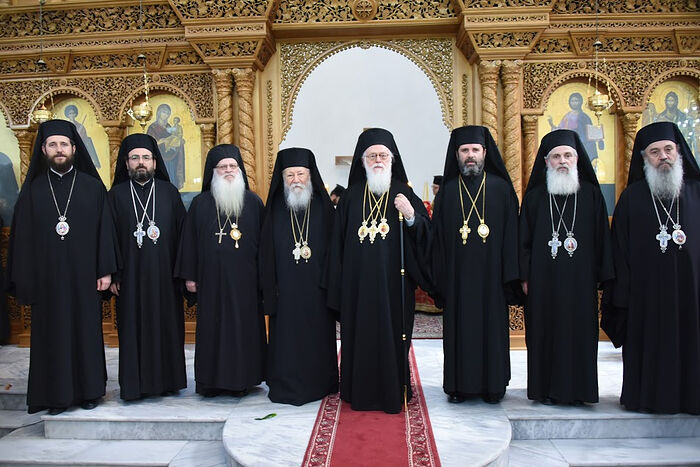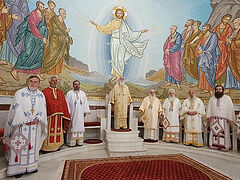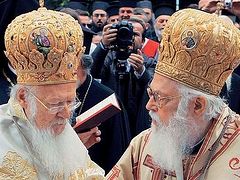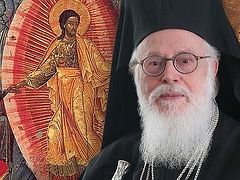Tirana, Albania, November 16, 2022
The Orthodox Church of Albania has again condemned Patriarch Bartholomew’s actions in Ukraine, where he entered into communion with unordained schismatics and unilaterally declared them to be an autocephalous Church.
This time, the Church’s statement comes in response to the postgraduate work of Archimandrite Gregorios Fragakis, Chief Secretary of the Patriarchate of Constantinople, “On the Healing of the Ecclesiastical Issue in Ukraine by the Mother Church of Constantinople (The Issue of Ordinations),” which was posted online and which talks about the granting of autocephaly to the Church of Albania in 1937.
“What is reported is inaccurate and indirectly misleading,” reads the report from the Office of the Holy Synod of the Albanian Church.
Unlike the bishops of the Albanian Church referred to in Fr. Gregorios’ thesis, “Metropolitan” Epiphany Dumenko of the “Orthodox Church of Ukraine” was ordained by a “defrocked, excommunicated, and anathematized bishop.”
Further, “In Albania, no group was ignored, as in the case of Metropolitan Onuphry together with the 90 or more bishops.”
It’s also noteworthy, the Church notes, that in the Albanian Church’s tomos of autocephaly, all Local Churches are referred to as “sister” Churches, not “daughter” Churches as they are called in the tomos of the OCU.
“Most importantly however, peace and unity have been brought to Albania, in contrast to what has happened in Ukraine, with adverse consequences for all of Orthodoxy.”
Additionally, the tomos to the OCU states that the Patriarchate of Constantinople is the head of all the Local Churches, while no such statement is to be found in the tomos of the Albanian Church.
According to the Albanian statement, the many examples of schisms referred to in the paper are not, in fact, analogous to the Ukrainian situation. The case of Ukraine is most similar to the 4th-century Melitian schism, where the healing of the schism and the integration of invalidly ordained hierarchs and clergy into the Church occurred through repentance, the laying on of hands by a canonical bishop, and the attainment of peace through the decision of a pan-Orthodox council.
Simple administrative decisions do not make that which never existed suddenly exist, the Albanian Church states, and “This is exactly where the concern for the validity of the ordination of Epiphany by Philaret comes from.”
Certainly the Church can act by economia, the statement continues, but cases where there are serious doubts must be dealt with by a pan-Orthodox council.
In conclusion, the Albanian Church clarifies that it “didn’t adopt a Russian point of view,” because it recognizes Constantinople’s right in principle to grant autocephaly in Ukraine, and it condemns the decision of the Russian Synod to break communion with the Patriarchate of Constantinople.
On Archbishop Anastasios’ and the Albanian Church’s previous statements on Ukraine
His Beatitude Archbishop Anastasios of Albania and the Albanian Synod have been making many of the same arguments for several years now.
In an interview in late December 2020, Abp. Anastasios painfully emphasized that Constantinople’s actions in Ukraine did not bring the desired healing, and that it’s long past time for the Church to deal with the issue conciliarly. Otherwise, the Church faces the danger of an ethno-racial divide between the Slavs and the Greeks, he warned.
Already in November 2019 he warned that “a worrying silence prevails in most of the Orthodox Churches.”
And His Beatitude has, in fact, been sounding the alarm almost since the crisis began in 2018. In October and November 2018, he wrote to His Holiness Patriarch Kirill of Moscow on the Ukrainian issue, where he notes that he had personally warned Pat. Bartholomew that his plans in Ukraine would prove disastrous. At the same time, the Albanian primate also strongly disagrees with the Russian Church’s decision to break Communion with Constantinople.
On January 4, 2019, the Holy Synod of the Albanian Church expressed its view that the ordinations of the hierarchs and clergy of the OCU are graceless and cannot be simply retroactively made real by decision of Constantinople. The Synod’s stance was expressed to Pat. Bartholomew personally in a letter, which was soon followed by another from Abp. Anastasios, handily debunking Constantinople’s self-justifying arguments and calling again for a pan-Orthodox council to handle the matter. (Abp. Anastasios has even received insulting letters from Constantinople hierarchs for his principled stand.)
In December 2019, His Beatitude again emphasized that conciliarity is the necessary principle for Orthodox unity, and that the creation of the OCU only brought “turmoil and divisions.” “In all the previous cases of granting autocephaly—and naturally to the Church of Albania—autocephaly was granted to the canonical Metropolises of each country and not to small sections of them composed of imperfectly restored schismatics,” he wrote.
In January 2020, the Archbishop told a visiting canonical Ukrainian delegation that he takes a keen interest in everything that is happening in Ukraine, and that he knows His Beatitude Metropolitan Onuphry of Kiev and All Ukraine is a peaceful man of deep prayer.
In January 2021, the office of Abp. Anastasios declared that, in contrast to the statement from Epiphany Dumenko at the time, the Albanian Church had not changed its mind at all and wasn’t close to recognizing the autocephaly of the OCU.
Follow OrthoChristian on Twitter, Vkontakte, Telegram, WhatsApp, MeWe, and Gab!





